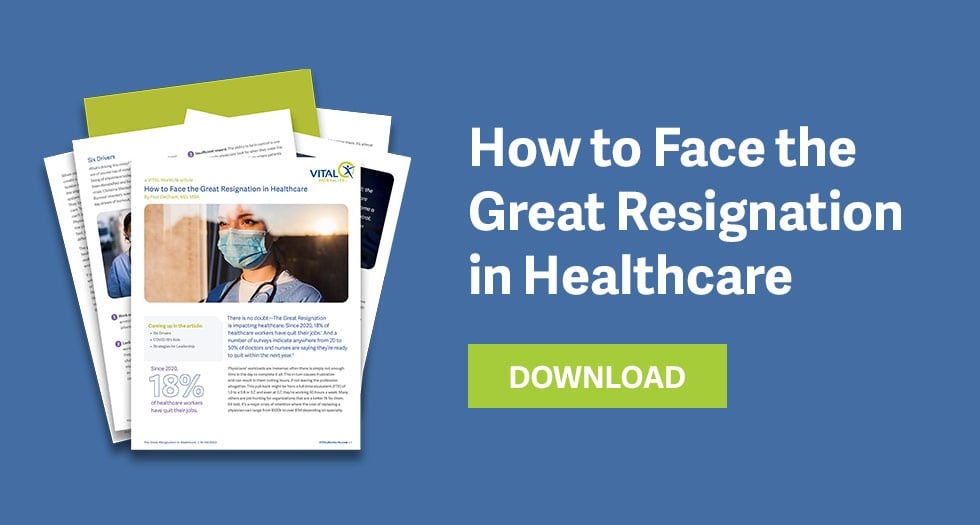Dev Srinivasan, CEO of Prime Health*, was thinking about the informal Gripe Sessions (GS’s they’ve been calling them) the staff at their Longacre hospital started in the depths of the pandemic.
The informal gatherings that the respiratory-care department had set up allowed physicians to let off steam. They’d used it under the harrowing conditions of the pandemic and the flood of work that followed the worst of COVID as patients returned for long-postponed care. The Longacre staff had found another way to care for each other’s mental and emotional well being too, with physicians paired up and committed to look out for each other.

Now, with the Great Resignation underway and just about every Prime Health unit short-staffed and many physicians on the verge of joining the mass exodus, Longacre’s respiratory department hadn’t had a single resignation for a year. Srinivasan, grappling with the Resignation’s fallout just about everywhere else, took notice.
He met with Longacre’s medical director, Dr. Harry Mead, and walked with him on the respiratory floor, taking a few minutes to speak with physicians, advanced practitioners and nurses who were able to spare a few minutes. He heard comments such as:
“The get-togethers have gone a long way to reconnecting me with folks. We were so isolated! Working all the time, in the heavy PPE. Now we get twenty minutes to be real twice a week.”
“I’m the one who brings the major stuff that comes out of the GS’s to Harry Mead, and Mead takes it to leadership. Some schedule adjustments were made from these that made sense.”
“Barrie Lederman and I look out for each other. The GS code is, you ask at least once a week for an ESR from each other—emotional status report. You have to tell the truth. To be honest, COVID made us all get a lot more real, so we can drop the tough doctor persona at least once a week.”
Srinivasan liked what he saw of course, but he realized it was grassroots. It said that physicians could care for each other, but it didn’t say the organization itself—Prime, the hospital CEOs, the clinic administrators, his leadership team—cared about the emotional and psychological well being of their people. That message had to be sent, to stem the Great Resignation tide and recruit, but also for Prime to be in the health business in an authentic and real way.
When Dr. Karen Orlovsky learned Prime Health had started a pilot program called Peer to Peer, she was skeptical. Two forty-five-minute introductory sessions with a “peer coach” to start, then the coach was available on an appointment basis? The coach was a physician? The sessions were absolutely confidential? No effect on licensure?
You could talk out your worries, frustrations, fears?
Dr. Orlovsky, a sprinter and a relay runner, knew what athletic coaches did. But what could a coach do about your feelings about medicine, your attitudes toward its stresses, your growing desire to get out? Wasn’t this really just therapy? Just about the last thing she needed to know right now was how her childhood traumas or her unresolved feelings had landed her in her current unhappiness.
But Orlovsky was not one to shrink from new challenges, so she sat down on Zoom with Dr. Lee Terrell, one of the coaches provided via Primes’ resources, and vowed to hear him out. To her surprise, what he offered was actually a kind of strength training–“What I hope we can do,” he said, “is build on your strengths, identify what you can do to claim real joy in medicine and let go of what you can’t control.”
Recently, her work life seemed dominated by issues over which she had no control. She had been losing sight of what she was doing brilliantly and what she really could make happen. So, she laid out her strengths as she saw them and, helped along by Dr. Terrell, sketched out a series of goals for self-care, professional growth and personal fulfillment. He introduced her to the concept of the “micro-movement,” the two-to-five-minute action on a daily basis toward one of those goals, no matter how busy you are.
And for the first time in what seemed like many years, Dr. Orlovsky felt like she had lifted her head just high enough out of the swirl of worry to catch some sunshine.
Nurse Marianna Obispo’s first session with her peer coach provided a different surprise. The coach, Jenna Wang, RN, said it was perfectly okay for her to talk about her family and their finances.
“Those personal issues impact you, right?” she said. “Let’s make a plan for you to connect more with Kyra. And I can refer you to a good financial planner.”
“So this isn’t just work stuff?”
“It’s what you need it to be,” said Jenna, “and from what you’ve told me, these things in your personal life need support too.”
It had never occurred to Marianna that an official program offered though Prime Health, or of any other big medical employer, could have anything to do with her relationship with her daughter or how much she and her husband would need for Kyra’s college and their own retirement.
This Peer coaching program is offered for the entire system. I guess they want to keep us, and I guess somebody gets the idea that we are real people. I’m actually kind of impressed they’re investing so much in our well being, Marianna thought.
This Peer coaching program costs money, thought Dev Srinivasan. But so does every physician, every nurse we lose. The partnership to provide peer coaching, and other physician well being resources, it well worth the cost.
Peer coaching is on the website and in the recruiting materials. Nobody knows yet what effect it will have on retention and recruitment. But it is already spreading the idea that Prime is committed to its people, and for some of those people a talk with a coach—a coach like one of them—is helping them to see that, to quote Dr. Lederman’s Gripe Session partner, “we can drop the tough doc persona.”
Srinivasan has other ideas about building what he’s seen referred to as a “culture of care for physicians.” Better channels of communication up the org chart. Getting leaders out on the healing floors to see what the physicians experience. Letting physicians have more control of what they know best. With more to come, as results and resources allow. The partnership with an organization, just like VITAL WorkLife, will help to grow and expand well being for their organization for every member of the care team.
Prime’s response to the Great Resignation is the Great Affirmation: we care for our patients and those who care for our patients.
VITAL WorkLife offers healthcare organizations a comprehensive suite of solutions designed specifically to reduce the effects of stress and burnout and create a culture of care for staff and employees. For more on how to support your physician's well being, reach us at VITALWorkLife.com or by dialing 877.731.3949.
*Prime Health is a fictional health system. None of the names, locations or scenarios are based on specific real life events, but are a fictionalized version of what has been generally experienced by many individuals and organizations.



